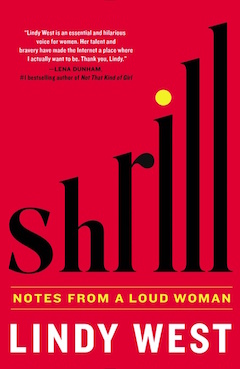Lindy West's writing process involves "a bat-haunted cabin in Maine"

West said she was proud of Shrill, that she finds the book to be "very, very vulnerable and very personal," and also "full of butts and periods." What she wanted in the book, she said, was to represent a woman's life as literature, "the way men's lives are presented." She said she's read plenty of "day-to-day experiences of men in literature, and it's been great," but women should be afforded that same kind of representation. Later in the evening, she added that a lot of men online seem to be very upset about the idea of women wanting to be represented, that they argue the fight for representation was pointless. "If representation doesn't matter," West responded, "why won't you fucking let go of it?"
After West read the first chapter of Shrill, the question and answer session mostly involved people seeking advice. How do we convince men to read the stories of women? West replied that everyone should "raise your young baby sons to read books about girls." What's the best way to fight back against trolls? West said she used to believe that it was important to "talk back on Twitter," but lately she's been feeling less inclined to enagage with them. She added, "I'm really into the trend of [sites with] no comments sections."
When asked about how she came to share some of the most personal parts of Shrill, West was clear about the fact that she still has boundaries. And she wanted young writers to know that it's okay to have boundaries of their own. "There is a writing culture that encourages, especially, young women to sell their deepest traumas for fifty dollars and I would encourage them to not do that." Almost as soon as West said that, she said she regretted saying it, because she didn't want to tell young writers what to do. If they wanted to share their story, that's fine, she said, but if they felt alarm bells going off as they turned their memories into writing, they should pay attention to the internal warning. "You don't have to give everything away to be a good writer, or even a good confessional writer," West said.
A lot of the questions had to do with her writing process. West's answers were decidedly not practiced, which seemed to make them more meaningful for the crowd. She said she still pores through Shrill wondering, "was that the best sentence I've ever written or the worst sentence anyone has ever written?" She also said that it took a long time to acknowledge that "me in my underwear at five AM eating Swedish fish and crying" was a natural part of the writing process. But once she accepted that, things got a lot easier. Her words seemed to encourage the aspiring authors who came to see her, and they all offered words of praise before their questions — "I read the book and I fucking loved it," someone said. It was the kind of hometown crowd reading that every author should hope for: a giant, loving room full of people who came not out of obligation, but out of love. That crowd left with the sense that West loved them back. Readings don't get any more meaningful than that.